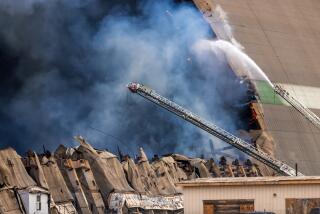Marines Return to Tustin After Stint in Somalia
- Share via
TUSTIN — “Welcome Home Barry,” read one hand-lettered sign. “Welcome Home Keano,” read a banner. Nearby, in a child’s writing: “Welcome Home Miguel.”
With bright yellow ribbons affixed to tree trunks, colorful balloons flying above the bushes and placards saying, “Welcome Home Guys” scattered around the base, a helicopter squadron of 250 U.S. Marines landed here Thursday morning after a 6 1/2-month mission, most of it in Somalia.
Fresh from Operation Restore Hope II, the Marines were anxious to restore themselves.
Most scampered off to be with their families, while the bachelors drained a government-issue keg of beer, lined up at the pay phones and relearned how to drive. They had missed the fires, the floods and the earthquakes while providing troop support and humanitarian aid in Mogadishu. But what they had missed most, perhaps, was non-military food and beds that do not move with the waves of the sea.
“Everybody just came in and, like you do anytime after you get off a ship for six months, you cram six months of partying into three hours,” said Sgt. Derek Somerville, who returned early from Somalia and helped prepare the hangar and the barracks for the troops. “Then, after that, some guys took off for dinner and a lot of them just went to sleep.”
By 4 p.m., nearly seven hours after landing, Cpl. Norman Lapinskas was still in his khaki uniform, all his civilian clothes churning loudly in the laundry machine near his room.
A wide smile plastered on his face, Lance Cpl. Dennis Martin, 21, had snuck into blue jeans but was still carrying his cup from the day’s party as the sun began to set.
Then, the pizza was delivered.
“Fantastic. More than that. It’s indescribable,” Lapinskas said when asked how it feels to be back.
“Every day, you wake up, you’re in the same spot, you do the same thing. Every day,” said Martin, recalling the 84 days the squadron spent on the ship or in the air, never touching the ground. “You don’t know what movies are out, you don’t know what songs are on, you don’t know what’s going on. It’s kind of like you’re frozen for six months and someone thaws you out.”
Down the hall, two guys in shorts and T-shirts huddled over telephone receivers, their fingers plugging their other ears.
“Is Jodi there?” one asked, expectantly. “This is Joe. . . . Yes, ma’am.” And then, relieved: “Not much. . . . It’s good to be home. Yeah. Got home today.”
These Marines were part of Squadron 268, the Red Dragons. They left San Diego last Sept. 3 for training in Japan and Hong Kong, but were redeployed to Somalia when the conflict there heated up in October.
In Somalia, the Red Dragons transported nearly 20,000 passengers and more than 3 million pounds of cargo while amassing more than 4,000 flight hours in their 16 helicopters. They also participated in medical and dental aid to Somali civilians, along with forces from Morocco, Nigeria, Italy and Pakistan.
Another Tustin squadron has replaced them in Somalia, Marine officials said.
Thursday morning, the squadron’s helicopters flew in formation, then, upon landing, were greeted by Marine Corps dignitaries and parents, sisters, brothers, spouses, and babies some had never seen.
Many of the troops said what they saw in Somalia was not as bad as the pictures on television, and some Desert Storm veterans said the months during Operation Restore Hope passed quickly and uneventfully.
“The worst part about it was the heat--after that, just missing home,” said Lance Cpl. Jason Feeney, who at 22 has already spent 4 1/2 years in the military, including a month and a half in Saudi Arabia and three months in Mogadishu. “It really wasn’t that bad.”
Feeney, who was married just a year ago, had a happy reunion with his wife, Esmeralda. Then, he got back to work.
“The first thing she said was, ‘Is this all your bags?’ ” he said, grinning. “Then, it was, ‘I missed you,’ and great big hugs that lasted all day.”
Capt. Rick Eppard, who left the mission a few weeks early to help prepare the Tustin base for the rest of the squadron’s arrival, said there was a mixture of anxiety and excitement among the troops when they learned they were going to Somalia. He fondly remembered the humanitarian aid operations, but recalled with fear the constant violence on the ground.
“It’s hard to put Band-Aids on large problems--it’s kind of a quick fix,” Eppard said of the medical and dental aid they provided. “They really need extended treatment, but we do what we can to help them.”
Regarding the local warlords, he added: “They call them tribes, but it’s similar to an L.A. gang: You go into one part of the city and this tribe owns it. If you’re not part of that tribe, you’re in trouble.”
Later in the afternoon, Eppard and some of the other Marines who had flown back early brought the squadron’s aircraft into the hangar and began maintenance work. The base was quiet, with the festivities over and the troops either asleep or gone for a long weekend.
“They get four days off,” Eppard explained. “Then they come back and we start it all over again.”
More to Read
Sign up for Essential California
The most important California stories and recommendations in your inbox every morning.
You may occasionally receive promotional content from the Los Angeles Times.













